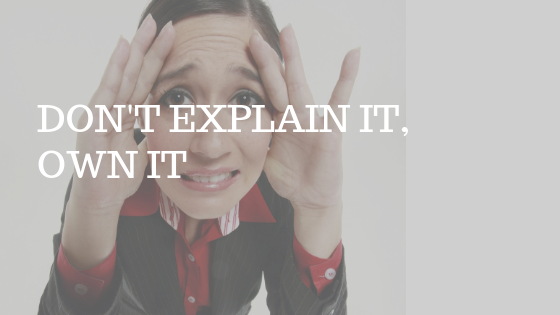An apology followed by an explanation is no longer an apology, but rather a justification.
That thought popped into my mind earlier this week when my 9:00 AM client strode into my office at 9:27 AM muttering something about traffic.
We all, at times, mess up. Whether we are late, don’t do something we have committed to doing or otherwise fall short on a promise or commitment, there have times in our lives when an apology is necessary.
And there is only one way to apologize. Here it is: apologize.
That’s it! Nothing more is required, then move on.
And yet that is not what we do. So many of us (I wish I could exclude myself) frequently feel the need to provide a reason for our non-performance as if that reduces the severity of our crime to a mere misdemeanor.
Explaining why does not alter the fact that we didn’t meet an expectation and providing a plausible reason does not lessen any adverse impact our wayward behavior may have caused.
Explaining Your Mistakes Is Not Necessary
So why is it that we feel compelled to erase our apology by trying to explain it away?
I believe we do this because by so doing we remove all guilt and responsibility from ourselves and position ourselves as poor victims – placed in a hopeless position over which we have no control.
As victims, we are blameless and worthy of pity rather than rancour.
As victims we deserve no negative consequence for our actions because we are, well, just victims.
Mess Up, Fess Up, Dress Up
While this may work on rare occasions, there is a way to more effectively manage these events. Two actions will separate you very quickly from the pack: acknowledgment and ownership. An old axiom tells us to “Mess up, Fess up, Dress up.”
Simply put, when you make a mistake, acknowledge it and then “dress up” in other words, address the situation; present yourself and take the required actions to turn things around.
Nowhere does it tell us to explain away our errant behavior.
In fact, the more we try to justify, the more we may damage our own credibility. We might even damage the relationship. Remember, it’s the relationship that is the priority, not the fact that you were late or why.
If you want to develop more meaningful relationships with others, act with integrity and practise “Mess Up, Fess Up and Dress Up.” You will be amazed at how many doors open for you, that for so very long were tightly sealed.
Till we read again.



Excellent article Rael. Something we all can take to heart. And becoming even more common is the phrase “I’m sorry you were offended by what I said (or did)”.